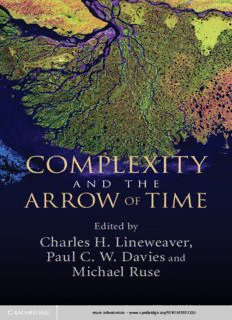Table Of Contentmore information - www.cambridge.org/9781107027251
Complexity and the Arrow of Time
Thereisawidespreadassumptionthattheuniverseingeneral,and
lifeinparticular,is“gettingmorecomplexwithtime.”Thisbook
bringstogetherawiderangeofexpertsinscience,philosophy,and
theologyandunveilstheirjointeffortinexploringthisidea.They
confrontessentialproblemsbehindthetheoryofcomplexityandthe
roleoflifewithinit.Whatiscomplexity?Whendoesitincrease,and
why?Istheuniverseevolvingtowardsstatesofevergreater
complexityanddiversity?Ifso,whatisthesourceofthisuniversal
enrichment?Thisbookaddressesthosedifficultquestions,and
offersauniquecross-disciplinaryperspectiveonsomeofthemost
profoundissuesattheheartofscienceandphilosophy.Readerswill
gaininsightsintocomplexitythatreachdeepintokeyareasof
physics,biology,complexityscience,philosophy,and
religion.
Complexity and the
Arrow of Time
Edited by
charles h. lineweaver
AustralianNationalUniversity
paul c. w. davies
ArizonaStateUniversity
michael ruse
FloridaStateUniversity
UniversityPrintingHouse,CambridgeCB28BS,UnitedKingdom
PublishedintheUnitedStatesofAmericabyCambridgeUniversityPress,
NewYork
CambridgeUniversityPressispartoftheUniversityofCambridge.
ItfurtherstheUniversity’smissionbydisseminatingknowledgeinthepursuitof
education,learningandresearchatthehighestinternationallevelsofexcellence.
www.cambridge.org
Informationonthistitle:www.cambridge.org/9781107027251
(cid:2)c CambridgeUniversityPress2013
Thispublicationisincopyright.Subjecttostatutoryexception
andtotheprovisionsofrelevantcollectivelicensingagreements,
noreproductionofanypartmaytakeplacewithoutthewritten
permissionofCambridgeUniversityPress.
Firstpublished2013
PrintedandboundintheUnitedKingdombyBellandBainLtd
AcataloguerecordforthispublicationisavailablefromtheBritishLibrary
LibraryofCongressCataloguinginPublicationdata
Complexityandthearrowoftime/editedbyCharlesH.Lineweaver,
PaulC.W.DaviesandMichaelRuse.
pages cm
Includesbibliographicalreferencesandindex.
ISBN978-1-107-02725-1(hardback)
1.Complexity(Philosophy) 2.Science–Philosophy. I.Lineweaver,
C.H.(CharlesH.) II.Davies,P.C.W. III.Ruse,Michael.
Q175.32.C65C64 2013
003–dc23 2013007433
ISBN978-1-107-02725-1Hardback
CambridgeUniversityPresshasnoresponsibilityforthepersistenceor
accuracyofURLsforexternalorthird-partyinternetwebsitesreferredto
inthispublication,anddoesnotguaranteethatanycontentonsuch
websitesis,orwillremain,accurateorappropriate.
Contents
Authorbiographies pagevii
PartI Introduction 1
1 Whatiscomplexity?Isitincreasing? 3
charles h. lineweaver, paul c. w. davies, and
michael ruse
PartII Cosmologicalandphysicalperspectives 17
2 Directionalityprinciplesfromcancertocosmology 19
paul c. w. davies
3 Asimpletreatmentofcomplexity:cosmological
entropicboundaryconditionsonincreasing
complexity 42
charles h. lineweaver
4 Usingcomplexitysciencetosearchforunityin
thenaturalsciences 68
eric j. chaisson
5 Onthespontaneousgenerationofcomplexityin
theuniverse 80
seth lloyd
6 Emergentspatiotemporalcomplexityinfieldtheory 113
marcelo gleiser
vi contents
PartIII Biologicalcomplexity,evolution,and
information 133
7 Life:thefinalfrontierforcomplexity? 135
simon conway morris
8 EvolutionbeyondNewton,Darwin,andentailinglaw:
theoriginofcomplexityintheevolvingbiosphere 162
stuart a. kauffman
9 Emergentorderinprocesses:theinterplayof
complexity,robustness,correlation,andhierarchyin
thebiosphere 191
eric smith
10 Theinferentialevolutionofbiologicalcomplexity:
forgettingnaturebylearningtonurture 224
david krakauer
11 Informationwidth:awayforthesecondlawto
increasecomplexity 246
david h. wolpert
PartIV Philosophicalperspectives 277
12 Wrestlingwithbiologicalcomplexity:fromDarwinto
Dawkins 279
michael ruse
13 Theroleofgenerativeentrenchmentandrobustness
intheevolutionofcomplexity 308
w. c. wimsatt
14 Onthepluralityofcomplexity-producingmechanisms 332
philip clayton
Index 352
Author biographies
eric j. chaisson is a Research Associate at the Harvard-
Smithsonian Center for Astrophysics and a member of the Fac-
ulty of Arts and Sciences at Harvard, where he teaches an
annualundergraduateclasson“cosmicevolution”.Hisscientific
research involves an interdisciplinary, thermodynamic study of
physicalandbiologicalphenomenathatseekstounderstandthe
origin, evolution, and unification of galaxies, stars, planets, and
lifeformsintheuniverse.Hiseducationalresearchengagesexpe-
riencedteachersandcomputeranimatorsincreatingbettermeth-
ods, technological aids, and novel curricula to stimulate teach-
ers and instruct students in all aspects of the natural sciences.
HeiscurrentlyaboardmemberoftheInternationalBigHistory
Association.
philip clayton is Ingraham Professor and Dean of the Faculty at
ClaremontSchoolofTheologyandProvostofClaremontLincoln
University. He received a joint doctorate in philosophy and reli-
giousstudiesfromYaleUniversityandhasheldteachingpostsat
Williams College and the California State University, as well as
guestprofessorshipsattheUniversityofMunich,theUniversity
ofCambridge,andHarvardDivinitySchool.Theauthororeditor
ofsometwodozenbooks,Claytonspecializesinthephilosophy
ofscience,especiallytheoreticalbiologyandemergentcomplex-
ity, and in the philosophy of religion and comparative religious
studies.
simon conway morris is professor of evolutionary paleobiology
at Cambridge University and a Fellow of St. John’s College. He
viii author biographies
was elected to the Royal Society in 1990 and has won vari-
ous medals and awards. His contribution to the Burgess Shale
was summarized in The Crucible of Creation, while some of
his earlier work on evolutionary convergence is discussed in
Life’s Solution (Cambridge University Press). He contributes to
the public understanding of science and the science/religion
debates.
paul c. w. davies is a Regents’ Professor and the founding Direc-
torofBEYOND:CenterforFundamentalConceptsinScienceat
ArizonaStateUniversity(ASU).HeisalsoPrincipalInvestigator
in the Center for the Convergence of Physical Science and Can-
cer Biology and co-director of ASU’s Cosmology Initiative. His
research has spanned the fields of cosmology, gravitation, quan-
tumfieldtheory,astrobiology,andcancerresearch,withparticu-
laremphasisonblackholes,theoriginoftheuniverse,theorigin
oflife,andtheoriginofcancer–topicsonwhichhehasauthored
or co-authored 30 books. He is a Member of the Order of Aus-
tralia,andtherecipientoftheTempletonPrize,theBicentenary
MedalofChile,theRobinsonCosmologyPrize,theFaradayPrize
of The Royal Society, and the Kelvin Medal of the UK Institute
of Physics. The asteroid 1992 OG was officially named “(6870)
Pauldavies”inhishonor.
marcelo gleiser is Appleton Professor of Natural Philosophy
and professor of physics and astronomy at Dartmouth College.
His research interests include the physics of the early uni-
verse, the properties of solitons in classical and quantum field
theories, and questions related to the origins of life and self-
organizing complexity. He is a fellow of the American Physi-
cal Society and an elected member of the Brazilian Academy of
Philosophy. He serves on the editorial board of National Geo-
graphic magazine. His two science series for Brazil’s TV Globo
were watched by more than 30 million viewers. He writes a
Description:There is a widespread assumption that the universe in general, and life in particular, is 'getting more complex with time'. This book brings together a wide range of experts in science, philosophy and theology and unveils their joint effort in exploring this idea. They confront essential problems be

